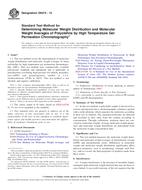We need your consent to use the individual data so that you can see information about your interests, among other things. Click "OK" to give your consent.
ASTM C1147-14
Standard Practice for Determining the Short Term Tensile Weld Strength of Chemical-Resistant Thermoplastics
STANDARD published on 1.5.2014
The information about the standard:
Designation standards: ASTM C1147-14
Note: WITHDRAWN
Publication date standards: 1.5.2014
SKU: NS-9724
The number of pages: 4
Approximate weight : 12 g (0.03 lbs)
Country: American technical standard
Category: Technical standards ASTM
The category - similar standards:
Annotation of standard text ASTM C1147-14 :
Keywords:
chemical resistant, plastics welding, short term weld factor, thermoplastic, welding, ICS Number Code 83.080.20 (Thermoplastic materials)
Additional information
| Significance and Use | ||||||||
|
5.1 The mechanical performance of welded thermoplastic structures is largely dependent on the quality of the welding operation. It is necessary for fabricators to determine that the proper welding procedures are being followed and that welders maintain their proficiency. Results from this practice are indicative of skill in proper welding procedures for different thermoplastic materials and the use of appropriate welding equipment. If the welded test specimens have short term weld factors that meet or exceed the minimums as set forth in this practice, it can be concluded that, with the same degree of skill and diligence by the welder, acceptable welds can be obtained in fabricated structures. |
||||||||
| 1. Scope | ||||||||
|
1.1 This practice covers the preparation and evaluation of joints between two pieces of weldable grades of thermoplastic materials, backed and unbacked, (such as those shown in 1.2 Since there are numerous new technologies and techniques constantly being developed for plastic welding, there are no profiles and procedures that can be considered as standard for all plastics at various thicknesses. This practice is not intended to define profiles and procedures; however, it is intended to establish methods to evaluate minimum short term weld factors to be achieved by the welder for the respective plastics. 1.3 Weld procedures used for test pieces shall reflect procedures to be used in actual fabrication. 1.4 Welding methods to be used include machine welding, extrusion welding, and hot gas welding. 1.5 This practice can be utilized by relevant certification bodies to assess welder proficiency and qualification. 1.6 The values stated in inch-pound units are to be regarded as standard. The values given in parentheses are mathematical conversions to SI units that are provided for information only and are not considered standard. 1.7 This standard does not purport to address all of the safety concerns, if any, associated with its use. It is the responsibility of the user of this standard to establish appropriate safety and health practices and determine the applicability of regulatory limitations prior to use.
|
|
Standard Test Method for Indicating Oil or Water in Compressed Air
|
|
Standard Test Methods for Physical Dimensions of Solid Plastics Specimens
|
|
Standard Practices for Force Calibration and Verification of Testing Machines
|
|
Standard Terminology Relating to Plastics |
Similar standards:
Historical
15.12.2012
Historical
1.6.2011
Historical
1.6.2011
Historical
1.6.2013
Historical
1.6.2011
Historical
1.1.2010
We recommend:
Updating of laws
Do you want to be sure about the validity of used regulations?
We offer you a solution so that you could use valid and updated legislative regulations.
Would you like to get more information? Look at this page.



 ASTM D6474-12
ASTM D6474-12 ASTM D6493-11
ASTM D6493-11 ASTM D6579-11
ASTM D6579-11 ASTM D6604-00(2013)..
ASTM D6604-00(2013).. ASTM D6605-06(2011)..
ASTM D6605-06(2011).. ASTM D6645-01(2010)..
ASTM D6645-01(2010)..
 Cookies
Cookies
